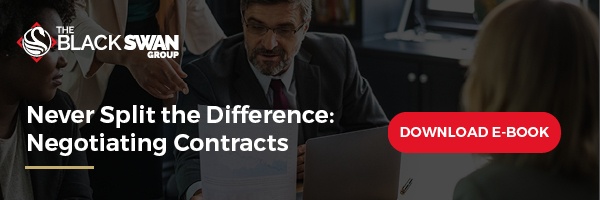In the world of negotiation, the word yes doesn’t always mean the same thing.
At The Black Swan Group, we teach that there are three different types of yeses:
- The confirmation yes
- The commitment yes
- The counterfeit yes
Here’s how to navigate each of them when you find yourself in the throes of a negotiation.
1. The Confirmation Yes
The confirmation yes is simply a sign of being respectful and making sure you and your counterpart are on firm ground. To get a confirmation yes, use a close-ended, verb-led question starting with does, is, do, or would or so. Think: Does that make sense?
The Black Swan Group refers to these as yes-oriented or yes-seeking questions. Even though you’re open to a no, you’re really seeking a confirmation yes so you can continue.
Does this look like something that would work for you?
At Black Swan, we believe that any yes-oriented question is a bad idea. Keep reading to find out why yes-oriented questions diminish rapport.
2. The Commitment Yes
If you’ve moved through several confirmations—usually three—they have to say yes to the commitment or else they violate the consistency theory, or so the overused advice goes. The thinking here is that saying no would be inconsistent with what the other side has already said.
This worn-out strategy is often referred to as momentum selling, yes momentum, or mere agreement.
The problem is that this strategy has been used so many times to trap people into the commitment yes that the counterfeit yes has become the default for both confirmation and commitment.
Globally, people are yes-battered. Would you like to save money on your car insurance? It doesn’t matter that you don’t intend it this way. Your counterpart has already been battered. What might happen if you raised your arms to give a battered child a genuine hug of warmth and affection? They’d flinch anyway because they’re conditioned to.
Even something as simple as Do you have a few minutes to talk? triggers the yes-battered syndrome. No one we’ve ever spoken to has told us that when someone asks them the preceding question, they respond with a joyful yes! Truth be told, everyone acts guardedly to yes-seeking questions.
(The Black Swan Group’s fix for this question in particular is this: Is now a bad time to talk? For those who automatically fear a yes response to this question, would you seriously want to keep someone on the phone who responded in the affirmative?)
In some descriptions of momentum selling, each commitment yes is even referred to as a “tie-down.” You tie the other side down and then they have to say yes to the commitment.
Unfortunately, the huge flaw in this is that it violates the essential human need for autonomy and is guaranteed to damage the relationship both short and long term. People will die to preserve their autonomy. In fact, the United States is even founded on the phrase Give me liberty or give me death.
The reality is that asking yes-seeking confirmation and commitment questions creates anxiety in people’s minds. They hesitate, wondering what the “hook” is. They wonder to themselves: What am I not seeing? What am I letting myself in for?
And that’s how rapport is damaged.
3. The Counterfeit Yes
As a result of the global yes-battering, this is largely what you’re faced with—if you are violating the 1st Deadly Sin of Negotiation, which reads: Do not be the hostage of yes.
Have you ever been given a yes only to later find out it was a no? You’ve been stung by the counterfeit yes.
The Black Swan Group’s preferred go-to move for dealing with a counterfeit yes is to stop fishing for yes entirely! As crazy as it sounds, as bad as yes is, no is magic. No is protection. No, is safety.
Human beings have been conditioned to experience feelings of safety and security after saying no based on their experience leading up to their interaction with you. (Just like Pavlov’s dog.)
So change your yes-seeking questions to No-Oriented Questions. You will be astonished by what people will comfortably say no to. Absolutely astonished.
We’ve actually coached people to say this to their bosses—Do you want me to fail?—when given an impossible task. The boss responds with a supportive no—and then adjusts their ask accordingly.
The Black Swan Group’s Top 10 No-Oriented Questions
Very simply, a no-oriented question is a question you ask when you’re fishing for a no. Without further ado, here are our top 10 no-oriented questions and their yes-seeking counterparts:
|
Yes-seeking |
No-oriented |
|
1. Do you have a few minutes? |
1. Is now a bad time? |
|
2. Do you agree? |
2. Do you disagree? |
|
3. Do you want ... ? |
3. Are you against ... ? |
|
4. Is this a good idea? |
4. Is this a bad idea? |
|
5. Does this work for you? |
5. Does this screw everything up? |
|
6. Can you ... ? |
6. Is it ridiculous for me to ask ... ? |
|
7. Is this correct? |
7. Am I out of line? |
|
8. Would you [take this action]? |
8. Are you opposed to [taking this action]? |
|
9. Does this make sense? |
9. Is this ridiculous? |
|
10. Would you still like ... ? |
10. Have you given up on ... ? |
Next time you get the chance, test-drive some of these questions. Again, you’ll be shocked by what people say no to—and that’s simply because people are comfortable saying no because it makes them feel safe and secure.
At this point, do no-oriented questions sound like a bad idea?
Make it rain!


